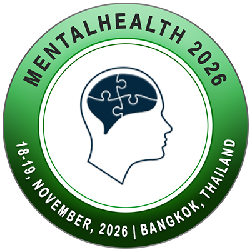Track: Women’s Mental Health
.jpg)
“Empowering Women’s Mental Health: Challenges, Solutions, and Advancements”
This session addresses the distinct mental health challenges faced by women, focusing on the interplay of biological, psychological, and socio-cultural factors. It will delve into how hormonal changes, reproductive health, and gender-specific stressors impact women's mental well-being. Key topics include conditions like premenstrual dysphoric disorder (PMDD), postpartum depression, and menopause-related mood changes. Socio-cultural influences, such as societal expectations and stigma, will also be explored, alongside practical strategies for building resilience, managing stress, and implementing self-care practices tailored to women’s needs. Participants will also gain insight into accessing specialized resources and support.
Biological Influences on Women’s Mental Health
An exploration of the biological factors affecting women’s mental health, including genetics, hormonal fluctuations, and brain structure. This session will focus on the role hormones play in conditions like PMDD, postpartum depression, and menopause-related mood changes. Participants will learn about the physiological underpinnings of these conditions and their implications for treatment and management.
Socio-Cultural Influences on Women’s Mental Health
An examination of the socio-cultural factors shaping women’s mental health experiences. This session will address the impact of cultural norms, societal expectations, and gender roles on mental well-being and access to care. Key topics include the effect of societal pressures, stigma, and support systems on mental health. Strategies for addressing these influences to improve mental health outcomes and promote equitable care will also be discussed.
Behavioral Influences on Women’s Mental Health
A focus on the behavioral factors influencing women’s mental health, covering lifestyle choices, coping strategies, and behaviors like substance use, physical activity, and self-care. Participants will gain knowledge of effective behavioral interventions and strategies for promoting mental health through healthy lifestyle choices and adaptive coping mechanisms.
Reproductive Health and Mental Health
An investigation into the intersection of reproductive health and mental health, with a focus on the impact of menstruation, pregnancy, and menopause on mental well-being. Topics will include PMDD, postpartum depression, and related mental health issues. Management strategies and treatments specific to reproductive health-related mental health conditions will also be explored.
Trauma and Women’s Mental Health
An exploration of the effects of trauma on women’s mental health, including sexual and domestic violence, and its impact on conditions like PTSD and anxiety. The session will also cover trauma-informed care and therapeutic approaches for supporting women who have experienced trauma.
Intersectionality and Women’s Mental Health
An exploration of how intersecting factors such as race, ethnicity, socioeconomic status, and sexual orientation affect women’s mental health. This session will address the unique challenges faced by women at these intersections and discuss strategies for providing culturally competent and equitable mental health care.
Mental Health in Aging Women
A focus on the mental health issues specific to aging women, including cognitive decline, late-life depression, and changes in social roles. Strategies for supporting the mental health and well-being of older women will be explored, with an emphasis on enhancing quality of life during the aging process.
Women’s Mental Health in the Workplace
An investigation of the mental health issues faced by women in professional environments. Topics include workplace stress, gender discrimination, and work-life balance. The session will also explore strategies for creating supportive work environments and addressing mental health concerns in the workplace.
Scientific Highlights
- Mental Health
- Women’s Mental Health
- Psychology and Psychiatry
- Autism
- Stress, Anxiety and Depression
- Psychotherapy and Counseling Psychology
- Behavioral Health and Bullying
- Suicide and Self Harm
- Bipolar Disorder
- Schizophrenia
- Neurology and Neurological Disorder
- Addiction
- Obesity and Eating Disorder
- Child and Adolescent Psychiatry
- Obsessive Compulsive disorder
- Post-Traumatic Stress Disorder
- Personality Disorder
- Child Abuse
- Legal and Ethical Issues in Clinical Research


